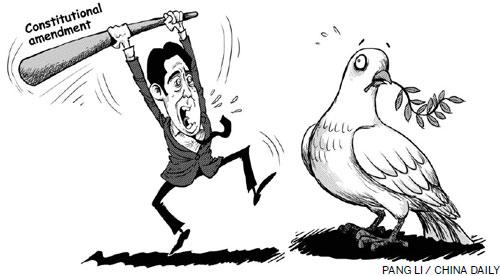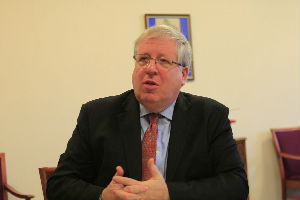Civil society opposes Abe, wants peace
Updated: 2013-10-28 07:03
By Atsushi Koketsu (China Daily)
|
|||||||||||

Since its inception in 1955, the Liberal Democratic Party of Japan has been attempting to amend the Japanese Constitution. The current Constitution was dedicated by the United States and is thus not in accordance with Japan's history, the LDP says, claiming that a "self-made" constitution is vital to Japan being a normal state.
The administration of Prime Minister Shinzo Abe has also been trying to change the nature of Japan's self-defense forces and transform them into a full-fledged military. The growing influence of neo-Asiatic Monroism within the LDP is an evidence of Abe and his advisors' ambitions.
The ambitions have aroused the suspicion of the US. Besides, many politicians within the LDP also are opposed to the Abe administration's move. As a result, despite winning the majority in the upper house of Japan's parliament, Abe still finds that it is difficult to transform the self-defense forces into a full-fledged military.
In an attempt to overcome the difficulty, Abe and his "Advisory Panel on Reconstruction of the Legal Basis for Security" have chosen to start with Japan's collective self-defense rights. Shinichi Kitaoka, president of International University of Japan and acting president of the panel, has said that since trustworthy allies could lower the potential risk of conflicts, tolerating collective defense rights could free Japan of the need to strengthen its defense forces.
Kitaoka's remark appears reasonable. But he has ignored, intentionally or otherwise, the fact that independent judgment of conditions by Japan is nullified by its alliance with the US. In case of fighting alongside the US, Japan would have no choice but to increase its firepower and strengthen its defense forces. Besides, contrary to advocates of independent self-defense rights, who hope Japan would strictly follow the principle of "defense only", Kitaoka has said that Japan does not necessarily have to hold fire unless attacked.
That, together with other remarks, reveals the Abe administration's true intention, of emphasizing collective defense rights, that is, to increase armaments by exercising Japan's rights overseas. In one word, Abe and his advisors hope to de facto amend the Constitution without mentioning it.
Abe has listed four reasons for Japan exercising its collective defense rights: protecting US ships that could be attacked on the high seas, intercepting missiles possibly launched against the US, safeguarding other countries' military forces that participate in peacekeeping operations, and sending troops and offering medical and other support to regions where wars break out.
But anybody with even a basic knowledge of military affairs knows that in reality Japan's action would never be limited to the above-mentioned four scenarios if it were fighting alongside the US. It is impossible for Japan to control the situation considering the nature of its alliance with the US.
By planning the military buildup, Abe has also broken a common rule followed by almost all Japanese cabinets since the end of World War II, that the country's self-defense forces should be just a little higher than its national defense capabilities.
Why is Abe busy doing so? Perhaps because the United States, as the primary ally of Japan, has given an indication of adjusting its alliance with Japan to cooperate with China. Moreover, the growing influence of "those in uniforms", or military officers, in Japan's self-defense forces, should also give an indication.
After the end of World War II, military officers in Japan's self-defense forces have been subject to the command of civil officers, or "those in suits", in the ministry of defense. However, the system underwent reform in 2004 and again recently, which seriously weakened the power of "those in suits".
The LDP has played an essential role in the reforms. And with their power gradually increasing, Japan's military institutions are heading toward greater independence from politics.
These efforts, together with Abe's and LDP's plan of creating a Japanese version of the "National Security Council" and cabinet intelligence bureau clearly expose their intention of building a strong military apparatus, which will turn Japan into a military state with no flexibility in the 21st century.
Worse, if the Abe administration implements militarization measures on Japanese society as a whole, civil society, which is proud of its liberty, self-regulation and self-discipline, will be destroyed.
Therefore, we cannot tolerate the "collective defense rights", which may automatically push Japan toward a war. What we need to do is to build a civil society that cherishes peace and gains the trust of other countries.
To realize that, it is necessary to expose the true intentions of the Abe administration. The prime minister who promises prosperity for Japan is, instead, leading the country toward disaster. We must defend the peace clause in the Constitution and let one and all hear our call: "Peace!"
The author is vice-president of the National Yamaguchi University, Japan.
(China Daily 10/28/2013 page9)
Related Stories
Abe leaves no room for talk 2013-10-28 07:03
Abe turns his back on history 2013-10-25 09:58
Beijing criticizes Abe's shrine offering 2013-10-18 01:24
China responds to Abe's Yasukuni Shrine offering 2013-10-17 19:13
Abe's nuclear trouble 2013-10-15 07:19
Today's Top News
British media figures in phone-hacking trial
Mythbuster dispels fictions about China
Forum urges stableChina-Japan ties
NSA spying hurts US diplomacy
Carrier rocket sent to launch base for moon landing
Requirements cut for business startups
Study shows PM1 most harmful
Cold snap to sweep NE, N China
Hot Topics
Lunar probe , China growth forecasts, Emission rules get tougher, China seen through 'colored lens', International board,
Editor's Picks

|

|

|

|

|

|





